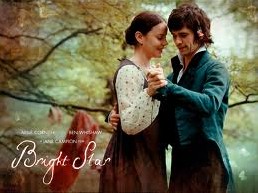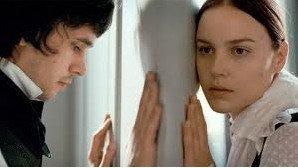Director: Jane Campion
Cast:
Abbie Cornish…Fanny Brawne
Paul Schneider…Charles Armitage Brown
Ben Whishaw…John Keats
Kerry Fox…Mrs. Brawne
英式发音 适合泛听
简介:  这部由BBC Films出品,由获得过奥斯卡最佳导演奖的简•坎皮恩执导的电影,因为说的又是英国著名诗人济慈的故事,未上映前就备受关注。美丽醉人的画面,考究雕琢的服裝,深思熟虑的台词和高素质的演员一直是BBC Films表现英国名著和经典题材的杀手锏;而导演从女主人公的角度铺陈故事,没有过于夸大史实,虚构情节,让整部影片看来恬淡而真实,让人久久回味。也正是这个原因,我们不妨可以用几段史实来交代这个故事的始末。
这部由BBC Films出品,由获得过奥斯卡最佳导演奖的简•坎皮恩执导的电影,因为说的又是英国著名诗人济慈的故事,未上映前就备受关注。美丽醉人的画面,考究雕琢的服裝,深思熟虑的台词和高素质的演员一直是BBC Films表现英国名著和经典题材的杀手锏;而导演从女主人公的角度铺陈故事,没有过于夸大史实,虚构情节,让整部影片看来恬淡而真实,让人久久回味。也正是这个原因,我们不妨可以用几段史实来交代这个故事的始末。
• 1818年,23岁的穷诗人济慈与邻居衣食无忧的范妮•勃劳恩悄悄相恋。但二人的关系不太被济慈的朋友和范妮的母亲看好。
• 1819年,这对年轻的恋人私下订婚,济慈创作了《灿烂的星》一诗献给范妮。
• 1821年2月23日,济慈客死罗马,年仅25岁。墓志铭上写着:Here lies one whose name was writ in water(此地长眠者,声名水上书)。
• 1821年,济慈病逝的消息传回伦敦,范妮悲痛欲绝,当时仅为19岁的她,坚持为济慈服丧多年,直到去世都一直没有摘下济慈送给她的戒指。现在,这枚戒指,连同她的一缕青丝,以及诗人写给她的一封信静静地躺在济慈博物馆的展厅中。
观影提示:
如果你现在有点倦意,或是有点利欲熏心,那建议你先将这部电影搁一搁。因为它没有热门商业片的那种强烈冲突和精致桥段,不能让你快意狂喜,它节奏缓慢,情节一般。但是,到了某一时候,当你渴望逃离喧嚣,找回生活中的一丝宁静时,不妨拿出来看一看。因为这个讲述200年前那个贫病潦倒的诗人的故事,可能会让你嚼出生活真正的况味来:如同一杯清淡的苦咖啡,味寡,带点浅涩,而后,却是回甘。
A Poetry Class 诗歌课
(Fanny comes to meet John Keats.)
Fanny: I’ve come for my poetry class.
Charles: Your poetry class? Poetry classes! Keats, are we teaching poetry today? I hope I don’t1)disturb.
John: Take a seat. Have a look at that. A poet is not at all poetical. He is the most un-poetical thing in existence. He has no identity. He is continually filling some other body, the sun, the moon.
Charles: I cannot restrain my 2)credibility longer. Miss Brawne, is this really you or are you acting?
Fanny: It’s really me.
Charles: Is it?
John: Charles, I have a pupil. 3)Desist or depart.
Charles: Apologies. My modest hope is that the cost of the lesson will not be the poet.
Fanny: The cost of the lesson is that Mr. Keats will4)forthwith discuss poetry with me.
Charles: You don’t mean to read the poems?
Fanny: Until I know all the poets and poems in the world, since I’ve nothing to do, as you so many times have noted.
Charles: (Going out of the room) I bow to your ambition.
Fanny: Now he’s gone, I shall find it easier to talk. Can you say something of the craft of poetry?
John: Poetic craft is a 5)carcass, a 6)sham. If poetry does not come as naturally as leaves to a tree, then it had better not come at all. I am mistaken. I am not sure I can teach you.
Fanny: Was I too rude? I... I can apologize.
John: I’m not sure I have the right feelings towards women. I’m suspicious of my feelings.
Fanny: Do you not like me?
John: I’m attracted to you without knowing why. All women confuse me, even my mother. I yearn to be ruined by 7)shrews and saved by angels, and in reality, I’ve only ever really loved my sister.
Fanny: I’m annoyed by my sister as often as I love her. I still don’t know how to work out a poem.
John: A poem needs understanding through the senses. The point of diving in a lake is not immediately to swim to the shore, but to be in the lake, to8)luxuriate in the sensation of water. You do not work the lake out. It is an experience beyond thought. Poetry soothes and 9)emboldens the soul to accept mystery.
Fanny: I love mystery.
(范妮来见约翰·济慈。)
范妮:我来上诗歌课。
查尔斯:诗歌课?诗歌课!我们今天教诗歌吗,济慈?希望我没打扰你们。
约翰:请坐。看下这个。诗人远不像诗歌,他是最无诗意的存在。他没有自我,总是借由世间万物——太阳、月亮等等充实自己。
查尔斯:我实在忍不住怀疑,勃劳恩小姐,你是真心还是假意?
范妮:我是真心。
查尔斯:是吗?
约翰:查尔斯,我在授课。要么闭嘴,要么走人。
查尔斯:抱歉。我仅仅是希望授课的代价不是把自己也搭进去。
范妮:授课的代价只为济慈先生能和我谈论诗歌。
查尔斯:你不打算读诗?
范妮:等我了解完了世上所有诗人和诗歌以后吧,反正我闲着没事干——你总是这么说的。
查尔斯:(走出房间)你的雄心令我钦佩。
范妮:他走了,我觉得讲起话更方便些。能说说写诗技巧吗?
约翰:写诗技巧有形无实。若不能有感而发,自然流露,还不如不写诗。我错了。我不确定我能教你。
范妮:是我太无礼了?我……我可以道歉。
约翰:我不确定我对女性的感情是否可取。我怀疑自己的感觉。
范妮:你不喜欢我?
约翰:我莫名地被你吸引了。女人都使我困惑,甚至我母亲亦如此。我渴望有大起大落的感情:被泼妇折磨,再由天使拯救。而现实中,我真正爱过的只有自己的妹妹。
范妮:我挺烦我妹妹的,但我很爱她。我还是不懂诗歌。
约翰:诗歌需要感官体会。那是一头扎入湖中,但却不立马游到对岸,而是置身湖中,尽情享受湖水的畅快淋漓。你不用读懂湖水,那是超乎思维的体验。诗歌抚慰灵魂,使之得以勇敢地拥抱神秘。
范妮:我喜欢神秘。
A Valentine Card 情人节卡片
(Keats discovers that Charles sent Fanny a valentine card and goes mad.)
Charles: John, wait. John.
John: I was away but 10 days, Brown, with you encouraging me to stay on and get well.
Charles: John, easy.
John: Now, you write Miss Brawne a valentine card. Are you lovers?
Charles: John.
John: Is that the truth?
Charles: Easy.
John: You sent a card, Charles! You have the income to marry, where I have not. Did you accept him, Miss Brawne?
Charles: John, I sent that valentine...It was only a10)jest.
John: For whom? I’m not laughing. Miss Brawne is not laughing!
Charles: John, I wrote the valentine to amuse Fanny, who makes a religion of flirting. John, she’s what? A poetry scholar one week and, what, a military expert the next?
John: You disgust me.
Charles: It is a game. It is a game to her. She collects suitors. John... John...
John: There is a holiness to the heart’s affections. Know you nothing of that? Believe me, it’s not pride! (To Fanny) You’re in love with Mr. Brown? Why don’t you speak?
Charles: She can’t speak because she only knows how to flirt and sew. Isn’t that right? Yes, and read all Milton, whose rhymes do not pounce, Miss Brawne, because there are none! John, there are one or two of her kind in every fashionable drawing room of this city, gasping over skirt lengths.
John: I’m sorry. We can have a poetry lesson tomorrow.
Fanny: No! I want to dance and flirt, talk of flounces and ribbons till I find my old happiness and humour.
(济慈发现查尔斯送了张情人卡给范妮后非常生气。)
查尔斯:约翰,等等。约翰。
约翰:我就离开了不过10天,布朗,那是因为你叫我继续待在那儿好好疗养。
查尔斯:约翰,别激动。
约翰:好了,你写了张情人卡给勃劳恩小姐。你们好上了?
查尔斯:约翰。
约翰:是这样吗?
查尔斯:别激动。
约翰:你送了那张卡,查尔斯!你有钱结婚,我却没有。你接受他了吗,勃劳恩小姐?
查尔斯:约翰,我送那张情人卡……那只是个玩笑。
约翰:为谁?我不觉得好笑,勃劳恩小姐也没笑!
查尔斯:约翰,我写这张卡只是为了逗范妮玩。她最爱打情骂俏。约翰,她算什么?这周当个诗歌学者,下周又成了军事专家?
约翰:你真让我恶心。
查尔斯:这只是逢场作戏。她就是逢场作戏,收集爱慕者。约翰……约翰……
约翰:爱慕之情是神圣的。你对此一无所知?相信我,这与自尊心无关!(对范妮说)你爱上布朗先生了?为什么不说话?
查尔斯:她开不了口,因为她只会调情和做衣服。没错吧?对啊,读遍所有弥尔顿的诗歌吧,他的诗歌不押韵,勃劳恩小姐,因为根本就没有韵脚。约翰,你看看伦敦的各个时尚的会客厅,都会有一两个她那样的女人,为了穿着打扮小题大作。
约翰:很对不起。我们明天还可以继续上诗歌课。
范妮:不要!我只想跳舞和调情,大谈锦衣华服,直到我能找回原来的快乐和幽默。

A Goodbye 道别
(On the night before Keats leaves for Italy)
John: We should say our goodbyes now.
Fanny: Shall we awake and find all this is a dream? There must be another life. We can’t be created for this kind of suffering.
John: I doubt that we will see each other again on this earth.
Fanny: Then why are you leaving? Why must you go?
John: Because my friends have paid my way. It is a hopeless hope, but how can I refuse them?
Fanny: Say you are too ill.
John: We have woven a web, you and I, attached to this world but a separate world of our own invention. We must cut the threads, Fanny.
Fanny: No. I can’t. I never will. You know I would do anything.
John: I have a 11)conscience. Let’s pretend I will return in spring.
Fanny: You will return.
John: We will live in the country.
Fanny: Close to Mama.
John: And our bedroom will look out onto a little apple orchard and, beyond that, a mountain in a mist.
Fanny: We can make a garden where every sort of wildflower grows.
John: And we will go to bed while the sun is still high.
Fanny: And when it becomes dark, the moon will shine through the shutters…
(济慈去意大利前的一晚)
约翰:现在我们该告别了。
范妮:会不会一觉醒来,我们就会发现这一切只是一场噩梦?一定还有别的出路。我们没可能生来就为受这种苦。
约翰:也许我们今生再难相见了。
范妮:那你为什么要走?你为什么必须走?
约翰:因为朋友们出了钱让我去。虽然希望渺茫,可叫我怎么拒绝?
范妮:就说你病得太重了。
约翰:你我编织了一张情网,与尘世相系,但那只是我们凭空构筑的理想世界。我们必须斩断情丝,范妮。
范妮:不要。我不能。永远也不会。你知道我什么都愿意做。
约翰:我不能违背良知。那就假装我春天会回来吧。
范妮:你一定会回来。
约翰:我们会住在乡间。
范妮:离妈妈不远。
约翰:我们的卧室外是个小小苹果园,再远处是雾霭中的远山。
范妮:我们可以在花园里种满各种野花。
约翰:日上三竿,我们仍能上床小憩。
范妮:暮色降临,月光会透过百叶窗倾泻而入……
A Farewell 永别
(Charles comes to visit the Brawne family on a snowy night.)
Charles: It’s cold out. How are you all?
Mrs. Brawne: We’re all quite well enough, but how is Mr. Keats?
Charles: Mrs. Brawne, it is as unbearable to me as I know it is to you. Mr. Keats has died. I received an account from Severn, and I’ve copied it for you, Miss Brawne. Shall I just read it?
“Friday, the 23rd of February. At four in the afternoon, Keats called me, ‘Severn, Severn, lift me up for I am dying. I shall die easy. Don’t be frightened. Thank God it has come.’ At one point, a cold, heavy sweat broke out over his whole body, and he whispered, ‘Don’t breathe on me. It comes like ice.’ Keats died 12)imperceptibly.”
Fanny: No more. Oh, God. John! Mama! Mama! I can’t... I can’t breathe.
Fanny: (Walking on the heath, reciting "Bright Star")
Bright star, would I were stedfast as thou art—
Not in lone splendour hung aloft the night
And watching, with eternal lids apart,
[Like] nature’s patient, sleepless Eremite,
The moving waters at their priestlike task
Of pure ablution round earth’s human shores,
Or gazing on the new soft-fallen mask
Of snow upon the mountains and the moors—
[No—]yet still stedfast, still unchangeable,
Pillow’d upon my fair love’s ripening breast,
To feel for ever its soft fall [swell] and swell [fall],
Awake for ever in a sweet unrest,
Still, still to hear her tender-taken breath,
And so live ever—or else swoon to death.
(查尔斯在一个大雪纷飞的晚上拜访勃劳恩一家。)
查尔斯:外面很冷。你们都好吗?
勃劳恩太太:我们都很好,不过济慈先生怎么样了?
查尔斯:勃劳恩太太,这事对你我来说都难以承受。济慈先生去世了。我从塞文处得到消息,也给你抄了一份,勃劳恩小姐。要我读一下吗?
“2月23日。星期五。下午四点,济慈喊我:‘塞文,塞文,扶我起来,因为我就要死了。我不会走得很痛苦。别害怕。感谢上帝终于到来了。’那时候,他突然全身直冒冷汗,喃喃道:‘别对我吹气,那冰冷得不行。’悄无声息中,济慈走了。”
范妮:别再读了。哦,上帝。约翰!妈妈!妈妈!我不能……我呼吸不了。
范妮:(走进丛林,吟诵《灿烂的星》)
灿烂的星!我祈求像你那样坚定——
但我不愿意高悬夜空,独自
辉映,并且永恒地睁着眼睛,
像自然间耐心的、不眠的隐士,
不断望着海滔,那大地的神父,
用圣水冲洗人所卜居的岸沿,
或者注视飘飞的白雪,像面幕,
灿烂、轻盈,覆盖着洼地和高山——
呵,不,——我只愿坚定不移地
以头枕在爱人酥软的胸脯上,
永远感到它舒缓地降落、升起;
而醒来,心里充满甜蜜的激荡,
不断,不断听着她细腻的呼吸,
就这样活着,——或昏迷地死去。
